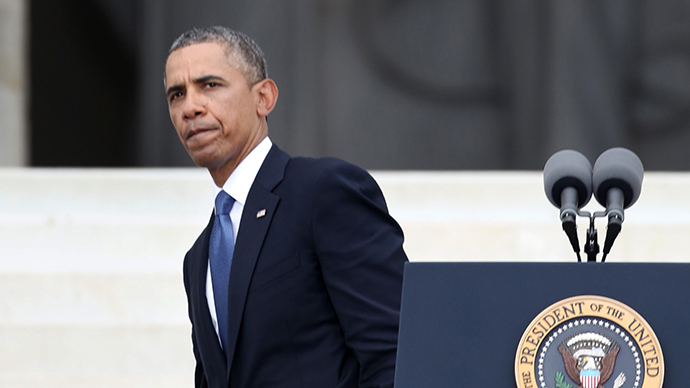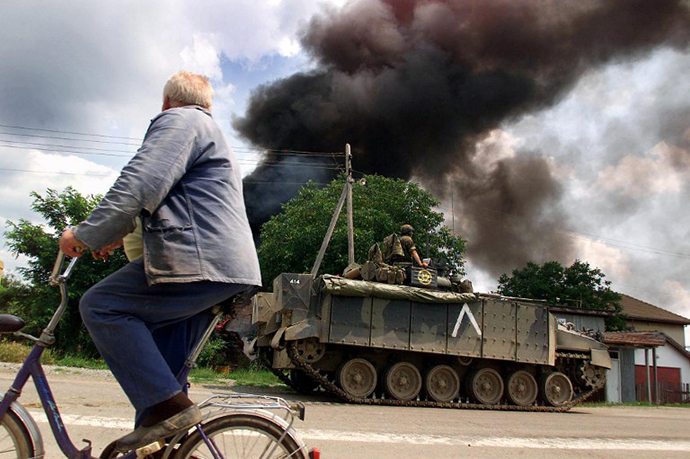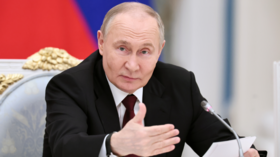Why Obama is at a loss over Syria

US claims that a strike against Syria is needed to “punish” Assad over alleged chemical weapons use are not policy. Instead, they show that Obama is at a loss what to do. The danger is that regional players may up the ante in this bloody conflict.
But let’s consider: How should we interpret “punish” in this case, anyway?
To “punish” a regime for an alleged event within that country’s borders is hyperbole, and a clear indication Obama doesn’t know what to do. The use of the term “punish” is profoundly disturbing as well. For example, do Washington and its allies intend to “punish” Assad to teach him something? If this is the case, how will the aggressor (the West in this case) know or understand when the victim of aggression (the Assad regime) has learned a lesson? Second, what if the punishment does not work? Will this necessitate an escalation, i.e. more punishment? What if Assad steps up his fight against the rebels he deems to be jihadist terrorists as a result of Washington’s punishment?
Limited strikes proposed by “cruise missile liberals” without a specified policy objective will only lead to an expansion of external military intervention. This may actually be the actual agenda of the Obama administration. If this is the genuine policy approach, then the outcome could be far worse than the precedent established with the fiasco known as Iraq.
“Punishing” Assad has yet another unintended consequence. Assad considers the civil war to be an existential one. It is very unlikely he will compromise while being attacked by NATO forces from the air. Also, key players in the region such as Iran and Saudi Arabia do not deal in half measures. Washington’s current confused policy may encourage regional players to up the ante when it comes to determining the facts on the ground in Syria. All the while, some of the most unsavory terrorist types in Syria’s rebel camp will continue to force their ideological and religious views on all they come across. This is a reality that Washington and company can’t come to grips with.
Misunderstanding Moscow’s intentions
So, what is the role for diplomacy now, and what can we expect from permanent UN Security Council members Russia and China?
Russia has warned the US about directly involving itself in the Syria civil war, correctly citing the parallels about how the Iraq war started and later ended in catastrophe for all involved (minus the profits earned by western arms producers).
There is a gross misperception about Moscow’s position when it
comes to Syria. Russia is not Assad’s protector, or even his
friend. Russia has a strong interest in seeing Syria preserved as
a sovereign state. Any decision coming out of Washington to
escalate the war undermines Syria’s ability to survive within its
current borders.

On the issue of diplomacy, it appears extremely unlikely that anyone from the Assad regime will sit at the same table with those (outside) powers who have killed Syrian civilians, including children. This surely disappoints Russian diplomats. A peace plan and a post-war settlement has always been Moscow’s policy objective. Now it appears to be a dead letter.
Russia will continue to support the integrity of the Syrian state, possibly with more arms.
In fact, Washington’s “Tomahawk diplomacy” will only further alienate countries such as Russia and China – and actually, most of the global community. Once the first cruise missile is launched, many in the West may soon regret the peace arrangement Moscow so consistently backed. Going forward, I expect Russia will continue to push for a negotiated settlement, possibly approaching the UN General Assembly. At this point, Washington will not be considered an honest broker.
‘Responsibility to attack’
The UN’s much-lauded “Responsibility to Protect” initiative claimed to be about preventing mass atrocities, but should it really be interpreted as “Responsibility to Attack”?
The difference seems to be in who is interpreting and applying it.
When interpreted and applied by NATO countries, “Responsibility to Protect,” or R2P, has been seen to be a sham. The case of Kosovo comes to mind (and looks to be a possible scenario for Syria). But what happened there? NATO bombed Serbia for weeks, and then put boots on the ground in Kosovo. Ethnic groups were separated and given their own separate states. And NATO troops are still there!
Then the case of Libya can be mentioned. Today Libya is a failing
or even failed state. The death toll during its civil war only
started to increase dramatically after NATO’s illegal expansion
of its involvement in the conflict.

Thus, in both cases the result has had preciously little to do with protecting anything. When we look at Syria – a far more complicated conflict – claiming military action in the name of R2P is a sick comedy. Syria has become a proxy war with toxic sectarian divides – it needs less violence, not more.
Sadly, R2P is just a cover for the west to remove regimes it does not like. So Kosovo, Afghanistan, Iraq, Libya and now Syria all have something in common: Washington’s self-proclaimed “Responsibility to Attack.” The expected attack on Syria by the US and its NATO allies only demonstrates yet again how the rule of international law rings hollow in western capitals.
The statements, views and opinions expressed in this column are solely those of the author and do not necessarily represent those of RT.
The statements, views and opinions expressed in this column are solely those of the author and do not necessarily represent those of RT.












